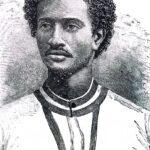MARITZ, GERHARDUS M.
- 4 Min Read
Gerhardus Marthinus Maritz (March 1797-September 23, 1838), also known as Gert Maritz, was one of the courageous organisers and leaders of the Great Trek, the mass migration of Afrikaner farmers accompanied by their families and servants, from the eastern part of Cape Colony into the interior; the migration took place from about 1836-46.
Maritz had been born in the disputed Suurveld, west of the lower Great Fish River, and had enduring childhood memories of Xhosa depredations. He was intelligent, energetic, and ambitious. He built up a lucrative wagon-making business in Graaff-Reinet and, with his imposing physique, strong personality, and business acumen, became an esteemed personage in the town. He frequently represented his countrymen as a business agent and in legal matters.
By also serving as warden and acting field-cornet he gained considerable experience in local administrative and judicial affairs. He shared the general grievances of the frontiersmen and became one of the principal propagators and organisers of the Great Trek. In September 1836 he led a large party, comprising about 700 people and over 100 wagons, north-wards. The far-sighted Maritz took along ample supplies of merchandise and a small library that included useful legal reference books.
In October 1836, at Thaba Nchu (“Black Mountain”), in what is now Lesotho, his party linked up with the trek headed by Andries Hendrik Potgieter. (Shortly before this, Potgieter had beaten off 20,000 Matabele, led by Mzilikazi, at the battle of Vegkop, but had lost his cattle to the enemy.) Here, on December 2, 1836, the assembled laagers by democratic secret ballot elected a Burgerraad (Citizen’s Council) of seven members.
Potgieter was voted commandant-general and Maritz “president” (chairman) of the Burgerraad and landdrost (magistrate). This meant that Maritz headed the administration and judiciary and was largely responsible for the good order that prevailed among the Trekkers. In January 1837 Maritz was joint commander with Potgieter of a successful punitive expedition against the Matabele stronghold of Mosega, whereby much of Potgieters’ stock was recaptured.
After the arrival of the trek headed by Peiter Retief, the government of the Trekkers was re-elected in April 1837. Retief was chosen as governor and commandant-general while Maritz retained his former position as “president” and landdrost. Like Retief, Maritz decided to settle in Natal. But Maritz opposed Retief’s proposal that a large commando should go into Zululand to negotiate with Dingane.
Fearing treachery, Maritz bravely offered to go with a small party in Retief’s stead, but Retief rejected the offer. The subsequent tragic murder of Retief and his men, followed by the massacre of scattered groups of Trekkers in Natal, proved Maritz right. His foresight in keeping his party in a well-sited laager enabled them to repulse a Zulu attack and provide a refuge for defenceless Trekkers.
In the Trekkers’ darkest hour, Maritz was a tower of strength. He took the lead in rescue operations and organised the care of the wounded and bereft. With a commando of 50 men, he also pursued the Zulu and managed to recapture stolen stock. Although the Trek was in jeopardy, Maritz rallied and encouraged the Trekkers, organised defences, and sent out successful appeals for aid to Port Natal and to the Trekkers in the Free State and the Cape Colony. Twice he travelled to Port Natal to obtain urgently needed supplies for the beleaguered Trekkers.
Despite an attack of fever he did not spare himself, and through his unceasing labours during this time of stress he overtaxed his strength. This led to his untimely death at the age of 42 in his laager on the Little Tugela River. In the history of the Great Trek Maritz stands out as a leader of stature, a passionate democrat, and the embodiment of law and order. His able services as an administrator and unstinting services to his fellow Trekkers were commemorated when the Voortrekker capital Pietermaritzburg was established and named jointly for Retief and Maritz.
L. E. VAN NIEKERK




